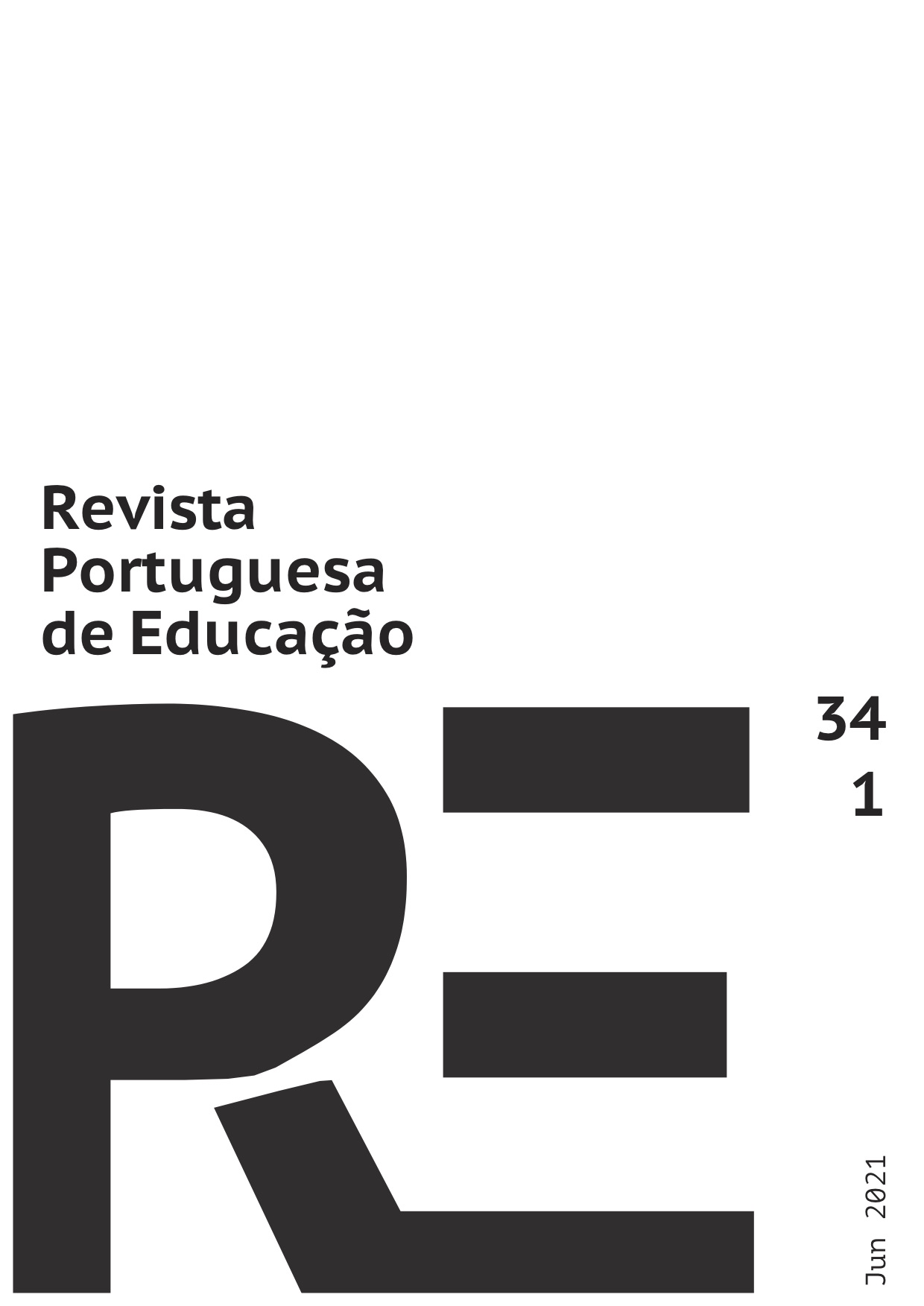Teaching in times of COVID-19: A study of Portuguese elementary and secondary school teachers
DOI:
https://doi.org/10.21814/rpe.21108Keywords:
Teaching, Assessment, COVID-19, Elementary and Secondary Education TeachersAbstract
This study aimed at understanding the ways in which Portuguese teachers have adapted to distance teaching as a result of the COVID-19 pandemic. A national survey was carried out through an online questionnaire. In total, 2369 teachers participated in the study. They came from all sectors of teaching. Findings show that the participants had to deal with a complex number of difficulties associated with the abrupt transition from face-to-face teaching to “emergency remote teaching”. This has implied the creation of conditions for pupils to access teaching, the reorganisation of teachers’ and schools’ work, the adaptation of the teaching and learning process and the mastery of diverse platforms and tools in order for teachers to interact with their pupils. Although a positive perception of the schools and teachers’ capacity linked to the valorisation of the internal resources and collegiality has been identified, negative effects were also highlighted. These included overload, stress, anxiety and burnout as well as the lack of capacity to provide an inclusive and universal response.
Downloads
References
Avalos, B. & Flores, M. A. (2021). School-based teacher collaboration in Chile and Portugal, Compare: A Journal of Comparative and International Education, https://doi.org/10.1080/03057925.2020.1854085.
Bao, W. (2020). COVID-19 and online teaching in higher education: A case study of Peking University. Human Behavior & Emerging Technologies, 2(2), 113–115. https://doi.org/10.1002/hbe2.191.
Barras, H. (2020). Évaluer dans l’urgence, en repensant sa planification à l’aide des principes issus de la gestion de crises. Évaluer. Journal international de recherche en éducation et formation. Numéro Hors-série, 1, 17-14.
Bozkurt, A. & Sharma, R. C. (2020). Emergency remote teaching in a time of global crisis due to CoronaVirus pandemic. Asian Journal of Distance Education, 15(1), i-vi.
Bubb, S. & Jones, M. A. (2020). Learning from the COVID-19 home-schooling experience: Listening to pupils, parents/carers and teachers, Improving Schools 2020, 23(3) 209–222.
Detroz, P, Tessaro, W. & Younès N. (2020). Évaluer en temps de pandémie. Évaluer. Journal international de recherche en éducation et formation, Numéro Hors-série, 1, 1-3.
Education International (2020). Guiding principles on the COVID-19 pandemic, https://www.ei-ie.org/en/detail/16701/guiding-principles-on-the-covid-19-pandemic.
Esteves, M. (2006). Análise de Conteúdo. In L. Lima & J. A. Pacheco (Eds.), Fazer Investigação. Contributos para a elaboração de dissertação e teses (pp. 105-126). Porto Editora.
Evetts, J. (2009). The management of professionalism: a contemporary paradox. In S. Gewirtz, P. Mahony, I. Hextall, & A. Cribb (Eds.) Changing Teacher Professionalism. International trends, challenges and ways forward (pp. 19-30). Routledge.
Ferdig, R.E., Baumgartner, E., Hartshorne, R., Kaplan-Rakowski, R. & Mouza, C. (Eds). (2020). Teaching, Technology, and Teacher Education During the COVID-19 Pandemic: Stories from the Field. Association for the Advancement of Computing in Education (AACE). https://www.learntechlib.org/p/216903/.
Flores, M. A. & Gago, M. (2020) Teacher education in times of COVID-19 pandemic in Portugal: national, institutional and pedagogical responses, Journal of Education for Teaching, 46(4), 507-516.
Huber, S. G. & Helm, C. (2020). COVID-19 and schooling: evaluation, assessment and accountability in times of crises—reacting quickly to explore key issues for policy, practice and research with the school barometer. Educational Assessment, Evaluation and Accountability, 32, 237–270.
Joyce, B. R., Weil, M. & Calhoun, E. (2004). Models of teaching (7.ª edição). Allyn and Bacon.
Judd, J., Rember, B. A., Pellegrini, T., Ludlow, B. & Meisner, J. (2020). This is Not Teaching”: The Effects of COVID-19 on Teachers. https://www.socialpublishersfoundation.org/knowledge_base/this-is-not-teaching-the-effects-of-covid-19-on-teachers/.
König, J., Jäger-Biela, D. J. & Glutsch, N. (2020). Adapting to online teaching during COVID-19 school closure: Teacher education and teacher competence effects among early career teachers in Germany. European Journal of Teacher Education, 43(4), 608–622. https://doi.org/10.1080/02619768.2020.1809650.
Moorhouse, B. L. (2020). Adaptations to a face-to-face initial teacher education course ‘forced’ online due to the COVID-19 pandemic. Journal of Education for Teaching, 0(0), 1–3. https://doi.org/10.1080/02607476.2020.1755205.
NFER (2020). Schools’ Responses to Covid-19. Pupil engagement in remote learning. https://www.nfer.ac.uk/schools-responses-to-covid-19-pupil-engagement-in-remote-learning/.
Sachs, J. (2016). Teacher professionalism: why are we still talking about it? Teachers and Teaching Theory and practice, 22(4), 413-425.
van der Spoel , I., Noroozi , O., Schuurink, E. & van Ginkel, S. (2020) Teachers’ online teaching expectations and experiences during the COVID-19 pandemic in the Netherlands, European Journal of Teacher Education, 43(4), 623-638.
Zhang, W., Wang, Y., Yang, L., & Wang, C. (2020). Suspending Classes Without Stopping Learning: China’s Education Emergency Management Policy in the COVID-19 Outbreak. Journal of Risk and Financial Management, 13(3), 55. https://doi.org/10.3390/jrfm13030055.
Downloads
Published
How to Cite
Issue
Section
License
Copyright (c) 2021 Portuguese Journal of Education

This work is licensed under a Creative Commons Attribution-ShareAlike 4.0 International License.
1. The authors preserve their authorship and grant the Portuguese Journal of Education the right to the first publication. The work is licensed under Creative Commons Attribution License that allows sharing the work with the acknowledgment of initial authorship and publication in this Journal.
2. The authors have the right to take additional contracts separately, for non-exclusive distribution of the published version of their work (e.g. to deposit in an institutional repository or as a book chapter), acknowledging the initial authorship and publication in this Journal.
3. The authors have the permission and are stimulated to post their work online (e.g. in an institutional repository or on their personal website). They can do this at any phase of the editorial process, as it may generate productive changes, as well as increase impact and article citation (see The Open Citation Project).
The work is licensed under Attribution-ShareAlike 4.0 International (CC BY-SA 4.0)




















